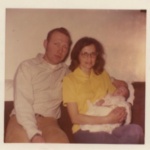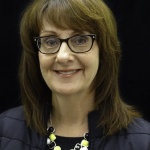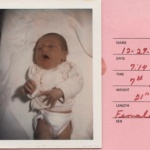by Marci Narum | Submitted Photos
When you grow up knowing you’re adopted, you can live with a sense of wondering; a feeling that something is missing. How did I come into this world? Who do I look like? Where is my birth mother? Is my birth father still alive? Do I have siblings?
My parents adopted me as an infant, and I’ve always known “I wasn’t expected, I was selected,” as the birth announcement states. I’ve had a lifelong curiosity about my history, though I never knew when or even if the time would be right to go through the search process. But earlier this year, I knew I was ready for this major life event.
THE RIGHTS TO SEARCH
If you are adopted, technology and DNA are common choices when you decide the time is right to begin a search. But chances are, an adoption agency helped your parents make you part of their family, so that can be the best place to begin. Cindy Skauge is a licensed social worker with Lutheran Social Services of North Dakota (LSSND). She has worked in various roles for LSSND for 37 years, the past 27 years in pregnancy counseling and adoption placement to helping adults search for and reunite with one or both birth parents or siblings.
“Almost every adopted adult I’ve worked with, when they come to the agency to check out doing a search, their hope and wish is that I’ll say, ‘Oh, they’re already searching for you,’ or ‘they’ve left a letter in your file for you,” says Cindy. “But the majority of birth parents that I contact…don’t know they have the right to search [for their child] and also believe that even if they have the right to search legally, that their child is the one who truly has the right to reach out to them, if they wish to.”
Cindy says if birth parents are aware of their legal right to search when the child is 21, many of them fear their child resents them for their decision, so they don’t take the risk. The adopted child can legally begin the search for birth parents at age 18, although Cindy says connections that happen at this age are not common nor very successful.
“Because at 18 we are all so immature; we don’t know who we are. So the majority of our [searches] are late 20s, 30s, 40s, and 50s. I’ve had some 60s search. So it needs to be a time in your life when you feel like, ‘This is the time, this feels right, and I’m open to whatever could happen.’ And that could be a no; hearing that they’re not open. Hearing tough history news that you may not have anticipated. But it also could be wonderful…a true blessing.”
Simple paperwork begins the process. Within days, the adoption agency sends non-identifying information about the birth and birth parents, such as age, ethnicity, descriptive features, and their marital and family status. Their names are not revealed.
“That gives you the history or story of your background. Often times it comes with surprises, things you didn’t expect from the birth mother’s side or the birth father’s side, or when reading the name you were given at birth by your birth mother. Sometimes people will just start with that [non-identifying information] because there’s a fear of what really happened. ‘Was I product of incest? Was I a product of rape?’ Sometimes their parents weren’t told as much. It’s just the way they did it back then. And sometimes they do learn some tough news. Many people learn that they share common interest or talents, such as in music and art. It also can answer questions such as who they got their red curly hair from.”
Locating a birth parent can take as little as three months or up to a year or more. When Cindy locates one, she simply shares that the child they released has requested contact.
“And I always ask if it’s a good time to talk, because sometimes I get a hold of birth mothers who have their husbands sitting with them, and they’ve never told them. They are then informed of their three rights under the North Dakota Disclosure Laws.”
Those rights are: 1.To say yes or no to contact, 2. If they say yes, they have limited contact followed by 3. Direct contact.
“They have the right to say no or decline contact,” Cindy explains. “They don’t even legally have to give medical information. If they do say no to contact, I always have a medical history form right there and try to verbally go through it so we can at least get the medical information.”
Limited contact means corresponding by email or through the adoption agency, using only first names. Direct contact allows each person to share names, addresses, and telephone numbers. An agency social worker facilitates how they will move forward to build the relationship.
“There isn’t a right way to do that or a wrong way,” Cindy explains. “It can be on the phone. I always encourage them to exchange photos first so they can connect that voice with a face. Some people will say, ‘I want to meet first and not talk on the phone.’ It’s really a building of a relationship.”
There are other relationships to consider, too: your parents, siblings, spouse, and children. Cindy prepared me for each conversation and shared insight I hadn’t considered. She says sometimes family members can become fearful of losing their child. She explained how to share the news of my decision with my family, the common emotions a birth mother experiences when she is notified, and how to manage my own concerns and fears.
“There is that loyalty we have to family. If you don’t have that—and it’s very few—there were issues in that home. My goal is always to help that person searching know that this belongs to them. I look at it as something to celebrate; that you’re starting this journey. It can be scary, overwhelming, exciting, healing, all of these different feelings, but it belongs to you. So I always encourage people to look at your own situation. They’ll say, ‘I’m afraid I’m going to hurt her’ [the adoptive mother], but I believe so strongly that this is your search, you need to go. And some people are not going to tell their parents, although we do support them to share with them if possible. The love you have for your adoptive parents and family does not diminish by doing a search. If anything, many people feel that it is stronger.”
Cindy says most searches result in positive connections and ongoing relationships.
“Every now and then I’ll have people call me back and say, ‘You know, we just didn’t connect.’
Sometimes they will say, ‘I am so grateful who my parents were, because my birth family is so dysfunctional; great, loving people, but I was the lucky one.’ Sometimes their half-siblings will say to them, ‘You’re the lucky one.’
“The hardest ones for me are when the birth mother says no. I need to help both sides understand where she’s coming from and help that birth mother walk through her own feelings of guilt and shame; being okay with that and connecting with her in such a way that if she ever feels ready, she can call us. That’s our hope, that people will be able to connect. Not everyone is open to that yet.”
THE PAINFUL SIDE
Secrecy, shame, and stigma are big reasons for that. Forty years ago, those were the normal, painful burdens an unwed mother would carry through her pregnancy—and for the rest of her life. It was also common for the birth mother, under pressure from her family, to release her baby for adoption, not knowing where that child was going to live or with whom.
“It was more common to have everyone buy into the stigma that this was a terrible thing, our family is going to be shamed, so we’re sending her to “Aunt Dorothy’s” and then she’ll come back after it’s all over.
“One birth mother talked about the labor and delivery,” Cindy recalls. “She was in the delivery room and having a hard time; the doctor came in and scolded the nurse saying, ‘Why didn’t you give her something for the pain?’ And she said, ‘Doctor, she’s an unwed.’ And then the doctor came to the mother and said, ‘You will get nothing. And you remember this pain so you never do this again.’” It was so embedded in our society that women were to blame, and that it was a very, very shameful thing that they had done.
“I’ve heard so many different stories about how it was very negative on birth mothers–not just from their parents, but from society. There was so much stigma, so much guilt and shame that was put on top of them. I think birth mothers still struggle with it today. They wonder, ‘should I have parented? I feel bad that I’m not, I love this baby.’ So I don’t think that is ever erased, and I think that is part of what they go through.”
ADAPTING WITH THE TIMES
Adoption is much different now. Cindy says it has adapted with the times and with the birth mother’s well-being and desires in mind.
“It is amazing how much it has changed from when I started working in it. Birth parents were just starting to be able to have information about adoptive families, so if I had a birth mom, I could say, ‘I have this family,’ and I would read information to her. Shortly after that, it went to having pictures that we could show [the adoptive family.] So then it started to have that openness.
“It’s something the birth mothers asked for. They wanted to know that their child was doing well; was in this family and was loved. Before, they had to just go by the social worker’s statement that yep, everything was fine. So I think part of that changed because the desire was strong–they really wanted that.
“The other piece that’s interesting is that many many times birth mothers would tell me that their parents said, ‘You’re not bringing that baby home.’ Now what we hear is, ‘You’re not going to put my grandchild up for adoption. No way. We’ll raise that baby. We’ll help you until you’re ready.’”
“COMPLETE” IS COMMON
Being ready to search–whether you are the adopted child or the birth parent–will be different for each individual. And regardless of the outcome, Cindy says it’s common for the adopted adult to feel some sense of completion after going through the process.
“They’ll say, ‘I know who I am now;’ a sense of self that they didn’t feel they had completely before. Many people will talk about having a hole and sometimes not even recognizing that until they start walking through this and start meeting birth family, and that can be no matter what the outcome. It’s important to have that knowledge.”
A sense of completion is exactly what I described after reading my history from LSSND. But what I have gained since then stretches far beyond what I expected or imagined. I am deeply grateful for my birth mother’s decision. I’m so happy my parents ‘selected’ me. And through my search journey, I have connected with people who warmly welcome me, wrap me in love, call me theirs…and tell me they feel complete. I am overjoyed to call them mine. As I get to know them, my heart cannot contain the love. It overflows; the only escape is through my eyes. They have been pouring love.
“It’s amazing how freeing and healing it can be,” Cindy says. “And it affects people differently. There is no one way to do this or one way a person is supposed to feel. Everybody is on their own journey. If you’re going to do a search, it needs to come from you wanting to do it.”



